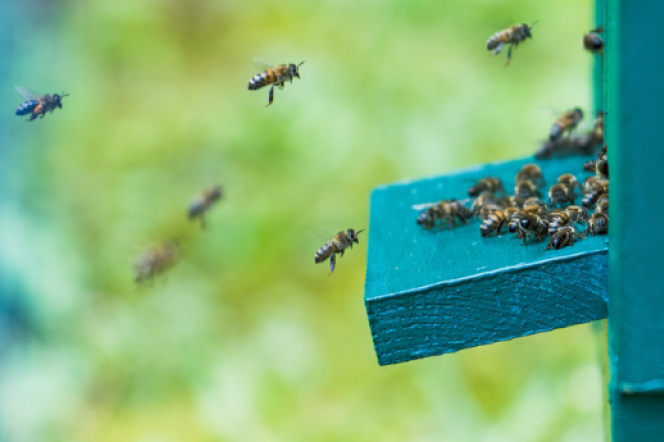Date added: 2020-07-02
Gdańsk University of Technology is developing research on bees

Beehives were erected on the university campus in May, and on 20 June they could receive their residents. The beginnings of three bee families (the so-called layoffs) were brought from the University of Warmia and Mazury, where the Beekeeping Department is located. Bees of the Kortówka line, native breed, were selected. These bees are extremely gentle and not very mobile. Coordinating the selection of bees and their transport to Gdańsk was carried out on behalf of Gdańsk University of Technology by prof. Robert Tylingo from the Faculty of Chemistry. It should be added that the originator of the entire undertaking is 12-year-old Bolek Jacaszek, a nature lover and beekeeping enthusiast.
Research plans
The university mini apiary will have an ecological function - the presence of bees in nature, also in the urban environment is at a premium, and scientific importance.
– We want to interest in the subject, for example, students of biotechnology and food analysis, but also the entire university community - explains prof. Robert Tylingo. - The profession of a beekeeper is a very important one and at the same time an interesting profession and maybe this is the way for some students of our university?
One of the first planned research, conducted jointly with students, will be to compare the composition of honey, the so-called ‘Urban honey’, produced by bees from the university with commercial honey, which is produced industrially in large apiaries.
– It turns out that even those honeys that are made in rural regions often do not have the right quality - explains the scientist. - Chemization of agriculture is very developed, and small-molecule organic pollutants are transferred with pollen to the hive and later to honey. Smog, which could be a source of honey impurities, does not occur in Gdańsk, which is why we want to check which honey is of better quality.
Bees already have their guardians
From the beginning, three guardians take care of the bees. Apart from Bolek, who lives near the university and visits the bees every day, and Professor Robert Tylingo, MSc, Eng. Tymoteusz Cejrowski, assistant at FETI, co-creator of the Smartul system for monitoring apiaries, which was established at GUT in 2017, also joined the beekeeping group. As soon as the bees settle on the university campus for good, a monitoring system will be installed in the hives.
– We treat the bee family living in the hive as one organism - explains Tymoteusz Cejrowski. - By measuring temperature and humidity, but also by examining the intensity of sounds produced by the swarm, with the help of dedicated algorithms we can examine whether the bees are healthy, whether they are not too cold, whether they become stronger or weak, and limit looking into the hive, which bees don't really like.
The Smartul tool is just finishing the testing phase. Thanks to the hives at Gdańsk University of Technology, it will be possible to work on site, making system adjustments on an ongoing basis. You can read more about the project [HERE]
Why hives are colorful
Three hives are the minimum number for bees to feel safe and be able to function normally in a new environment. For now, they are not full families, professionally called layoffs in beekeeping, but it is estimated that within a year they will reach the number of about 20 thousand bees in one hive.
– The hives that my grandfather built especially for these bees come in different colors - explains Bolek Jacaszek - it is important that they are not the same. They must be distinguished by at least a colorful emblem, because bees remember colors and know which hive to fly into. A mistake could cost them their lives.
All costs related to the purchase of bees were covered by the company: Restudio Jacaszek Architekci Sp. z o.o., whose co-owner is Bolek's dad - Maciej Jacaszek and thanks to the scholarship for academic results that Bolek received and allocated for this purpose.

